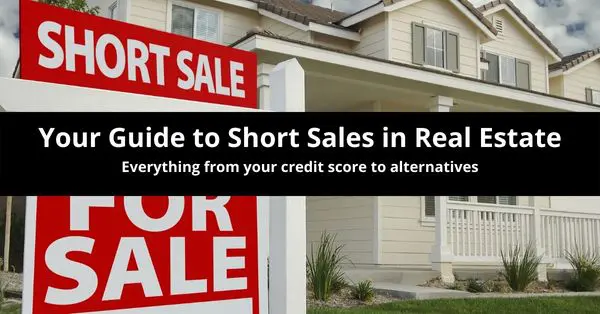A short sale in real estate is when a homeowner sells their house for less money than they owe on their mortgage. Short sales normally occur when the person is in financial trouble or their home is considered “underwater,” meaning the home value is dropping. And this happens more often than you’d think. So don’t worry if it is happening to you, short sales are common in real estate and are nothing to be embarrassed about.
A house can be considered “underwater” and prime for a short sale when the:
- Homeowner refinanced the remaining equity in their house
- House was overvalued when it was purchased and the property values in the area are dropping
- Property has been damaged from natural disasters, or a lack of upkeep, and the owner does not take the steps to fix it up
- Neighborhood is being redeveloped and more “in demand” homes are being built making the home less “in-demand”
- The homeowner has debt piling up from medical bills, unpaid credit cards, job loss or other financial problems
There is a catch though, just because your home is underwater does not mean you can do a short sale.
In order for a short sale to happen the homeowner must have permission from the lender and all of the profits from the short sale go directly to the lender. In return for the money going to the lender, the lender will usually forgive any remaining debt. But you still need to get your lender’s permission which isn’t always easy.
The reasons your lender may not approve your short sale request include:
- If there is more equity in your home than the sell price
- The sale price could be higher than what you want to list it as, and then a foreclosure auction may result in a higher recovery
- Your selling price is too high and your lender does not see anyone buying it
- The representative from the lender was having a bad day, call back the next day and you may get approved
With that said, there are good reasons for both a homeowner and a lender to want to do a short sale.
The main reason a lender and a homeowner will take the short sale option is because a short sale is less damaging than a foreclosure for the homeowner, and short sales are less time consuming and costly than a full foreclosure for the lender. But be ready to answer some personal questions if you choose a short sale. Your lender will begin asking about your financial situation and see if it is likely you’ll be able to pull out of it. Remember, they don’t have to approve a short sale, so be honest with them.
If you are able to rebound and begin paying your mortgage, your house will eventually leave its “underwater” status and you’ll be back on track. Yes, the property value may not go up so you still owe more on your mortgage, but at least your credit will be in tact and you’ll have peace of mind with the security of not losing your home.
If it doesn’t look like you’ll be able to pull out from underwater, a short sale could be a good option. Like with everything in life, there are both positives and negatives.
Pros And Cons Of A Short Sale
The pros of a short sale:
- The bank will likely forgive your debt and in some states it is guaranteed
- You choose the process and you can hire a real estate agent if you’d like
- Instead of you covering agent commissions, the lender pays them off
- You will likely be eligible for a new mortgage from the time you close up to two years
The cons of a short sale:
- Your credit score can drop 85-150 points
- The lender needs to approve all negotiations removing some of your control
- You walk away with no money in your pocket
- The process can take up to a year
Pro-tip: If the short sale process takes too long, or you want cash in hand, you can sell your house fast to a company like ours and walk away without any additional hassles.
If a short sale sounds like the best option for your situation, here’s how the process works.
The Short Sale Process
Short sales use a five step process:
- Contact your lender to get the approval.
- Hire an agent to list your home, or do a FSBO (for sale by owner) transaction.
- Submit the offers to your lender for approval.
- The lender will negotiate any repairs and final details.
- Now the lender closes with the buyer and you can move on.
Once the process is finished you may get your debt forgiveness. This is a big benefit to you.
Say you owe $300,000 but your home is worth $200,000. You’d be left with $100,000 in debt after selling, which is called your deficiency. Usually a lender will forgive this deficiency. Visit your state’s .gov website to see if you live where debt forgiveness is required by law after a short sale.
But sometimes a lender might use something called a ‘deficiency judgement’ to get that $100,000 back from you. To keep this from happening, make sure the lender officially waives their right to a deficiency judgment and says the short sale satisfies the debt and have it in writing.
But not all short sales get approved by the lender, and if your financial situation gets worse, you could face foreclosure. Foreclosure and a short sale have very different outcomes.
Short Sale vs Foreclosure
Short sale and foreclosure are both options when you’re falling behind on your mortgage.
Both can drop your credit score 85-150 points, but a short sale allows your credit to climb much more quickly. This is because foreclosures are a result of late mortgage payments which are recorded on your credit history, while a short sale can happen without missing any payments.
Another major difference between short sale and foreclosure is the process. During the foreclosure process, a bank claims ownership of your home and auctions it off, while with a short sale, you keep ownership of your home and you have more control over selling the house.
The last difference between short sales and foreclosures is time. Foreclosures can be over quickly as 2-4 months, while short sales involve lots of red tape and can take up to a year to complete.
Short sales are a good option if you’re facing hardship and you can get approved. And if you don’t get approved, or need cash, call us at and learn about how you can sell your house for cash.


